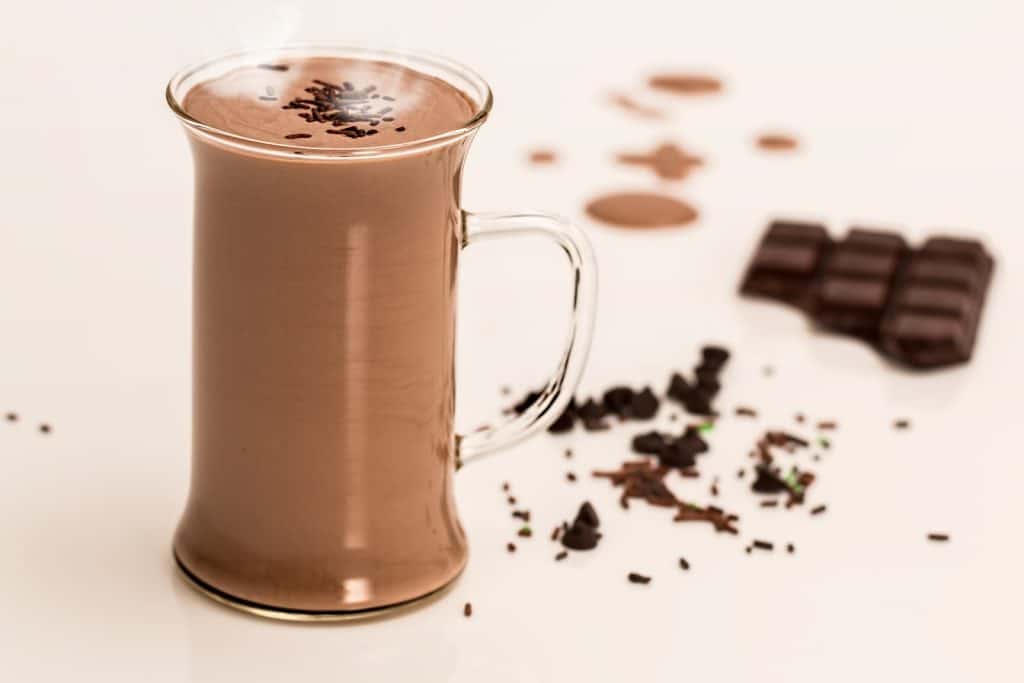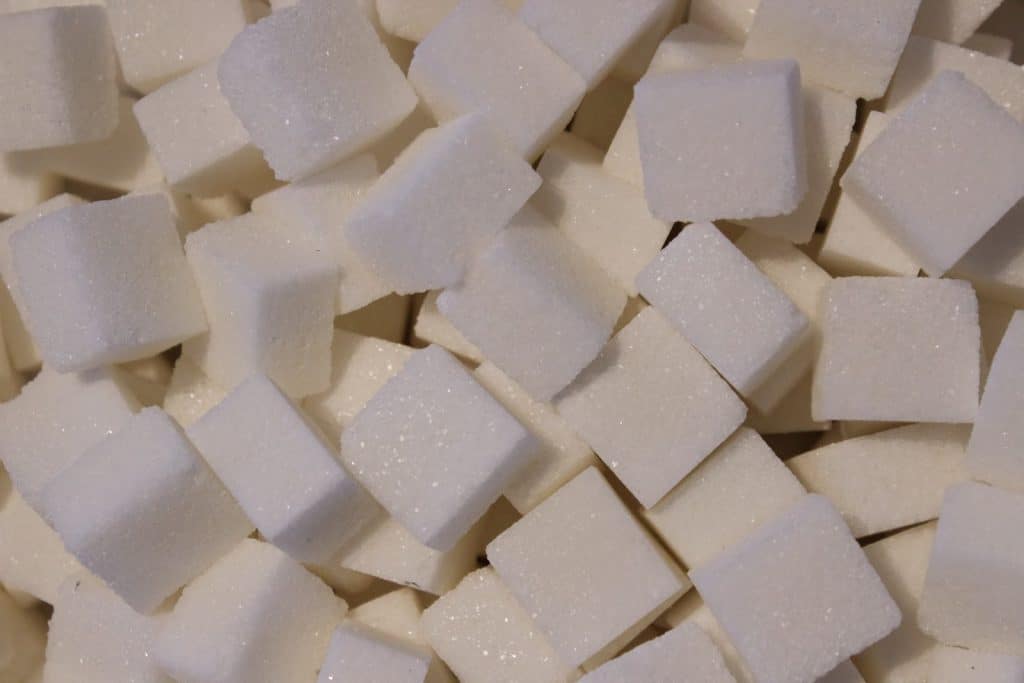Drinking milk is considered an effective homemade remedy for both adults and kids to deal with troublesome sleep. But can you drink chocolate milk for the same purpose?
Yes, drinking chocolate milk as a bedtime drink can help you fall asleep. The milk present in the drink can make you feel relaxed and enjoy a restful good night’s sleep, especially if you make it warm.
In this article, we’ll discuss how drinking chocolate milk can help you with sleep and what the science says about it.
How does chocolate milk make you feel sleepy?

Drinking chocolate milk can make you feel sleepy because milk contains a particular amino acid, tryptophan, which increases the production of serotonin and melatonin in the body.
Serotonin is the neurotransmitter in your body that’s responsible for making you feel alert as well as sleepy. According to studies, low serotonin levels can cause sleep disruption and sleep disorders.
That’s because this neurotransmitter allows your body to produce melatonin. Melatonin is a hormone that makes you feel sleepy and regulates your sleep-wake cycle.
All this means that drinking chocolate milk can make you feel sleepy as the milk content has an impact on your sleep hormones and helps your body feel relaxed and ready for sleep.
Does drinking chocolate milk help you sleep?
As mentioned above, drinking chocolate milk can help you fall asleep if you drink it before going to bed. That’s because the milk content of chocolate milk contains tryptophan amino acids that can improve your body’s serotonin levels.
As a result, your body will produce more melatonin that will help you fall asleep quickly. Additionally, chocolate milk also contains vitamin D and calcium which offer many health benefits as well.
Warm drinking chocolate and feeling sleepy
The psychological effect of hot chocolate milk can also help your sleep better. Warm milk reminds us of comfort and of our childhoods. It also helps us to feel mentally relaxed, warm and comforted. This psychological factor means that warming up your drinking chocolate can increase its affect and help us sleep better.
Can drinking chocolate milk keep you awake?

There are many other substances in chocolate milk that can affect your sleep. The following are the most important ones that you should keep in mind.
Caffeine
One of the most important ones is caffeine. One ounce of chocolate contains about 12 milligrams of caffeine.
While it’s a very low amount, you’ll find it difficult to fall asleep after drinking chocolate milk if you’re caffeine sensitive. Therefore, if this applies to you, you should avoid drinking chocolate milk before going to bed.
Read also: How to prevent dehydration during sleep
Sugar

Chocolate milk contains sugar content and it can affect your sleep quality. According to a study, your sugar consumption can increase the time you need to spend to fall asleep. Additionally, it can also affect the amount of time that you usually spend in your deep sleep.
Another study shows that your sugar intake can change the levels of tryptophan amino acids in your body and affect your sleep quality. If your hot chocolate milk has too much easily digestible sugar, fructose, and glucose, it’ll make you feel sleepy very quickly but you’ll become alert shortly after.
It happens because the levels of sugar in your bloodstream increase dramatically which makes you feel sleepy. However, your body automatically starts to decrease the blood sugar level and overcompensates it. As a result, the sugar level of your bloodstream becomes even lower than normal, making it difficult for you to fall asleep.
So, drinking a bedtime drink that contains a lot of sugar isn’t great for your health, especially if you consume it daily. Also, excess sugar can make you more gassy at night.
Read also: Does sugar cause night terrors?
Cocoa
Another ingredient present in chocolate milk is cocoa powder or dark chocolate. They contain polyphenols, which are incredible antioxidants. According to studies, polyphenols can also improve your sleep quality.
Additionally, cocoa can also minimize different types of psychological distress linked to sleep, like blood pressure. According to a meta-analysis of the effects of cocoa, cocoa powder can reduce systolic and diastolic blood pressure significantly.
It’s important to note that people suffering from chronic sleep disorders, such as insomnia usually have a problem with higher nighttime blood pressure. Cocoa, present in chocolate milk, can help people who are suffering from disturbed sleep.
Other than sleep disorders, worrying thoughts, depression, anxiety, and stress can also raise nighttime blood pressure. Not only do they make it difficult to fall asleep but they can also wake you up multiple times during the night.
Consuming cocoa through chocolate milk can also help with that and improve your overall sleep quality. However, you’ll need to use 100 percent pure cocoa powder to reap all these benefits.
What Food Options Can Improve Your Night’s Sleep?

Other than chocolate milk, the following are some of the best food items that you can consume before going to bed to improve your sleep quality.
Bananas
Bananas contain healthy electrolytes, including magnesium and potassium. Studies show that these electrolytes can improve your sleep quality and can also minimize the symptoms of chronic sleep disorders such as insomnia.
Not only do bananas help you with sleep but they also allow you to feel relaxed throughout the night. However, eating bananas can cause night terrors if consumed too close to bed time, so be sure to eat them earlier in the day.
Cherries

Consuming cherries before going to bed is one of the best ways to fall asleep quickly. That’s because this food makes for an excellent source of melatonin and regulates your sleep-wake cycle. Eating cherries can also fix disruptions related to your biological clock and treat symptoms of sleep disorders.
Pistachio
Pistachios are rich in vitamin B6 and they can improve your sleep quality. According to a study published in Oregon State University, vitamin B6 can help with depression, which is one of the reasons for sleep deprivation.
Additionally, another study published in the National Library of Medicine states that vitamin B6 can minimize the symptoms of mild to moderate insomnia.
Meat

Other than dairy products, tryptophan is also present in meats, such as red meat, turkey, chicken, and fish. It means that consuming lean meat will increase the levels of tryptophan in your body which will increase your body’s serotonin levels.
It allows your body to go through another enzymatic process that converts serotonin to melatonin and makes you feel sleepy. Not only does it allow you to fall asleep quickly but it also keeps you asleep without needing to wake up multiple times during the night.
FAQs
Can You Drink Chocolate Milk Every Night?
Yes, you can drink chocolate milk every night but you shouldn’t make it a habit. That’s because the sugar content of this drink can affect your sleep quality and the amount of time you spend during deep sleep. Additionally, it can also make it difficult for you to fall asleep if you’re caffeine sensitive.
Can Chocolate Milk Lead to Weight Gain?
Chocolate milk contains many healthy nutrients, such as vitamin D, protein, and calcium that can improve your health in multiple ways. However, the drink also contains sugar and a lot of calories that can lead to weight gain. So, you should avoid drinking chocolate milk if you’re trying to lose some weight.
Read also: How to go back to sleep after a nightmare
Conclusion: Does Drinking Chocolate Milk Help You Sleep
The nutritional profile of chocolate milk contains both types of nutrients that can help you with sleep or keep you awake. For example, if you’re a caffeine-sensitive person, then chocolate milk won’t help you with sleep.
If you’re not caffeine-sensitive, then this drink can actually help you fall asleep quickly because of its tryptophan and cocoa content. But you’ll need to make sure that you don’t consume this drink excessively as it contains sugar and a lot of calories that can lead to weight gain.
